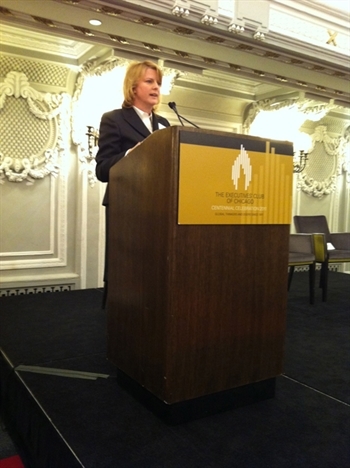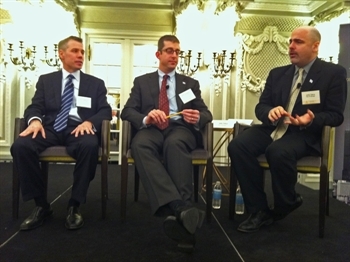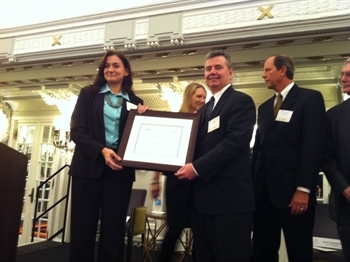Mayor Emanuel’s new tech execs talk about taking Chicago into the cyber future
Lou Carlozo
Published: October 26, 2011
Related to: Chicagoland eTeam
Though it’s a long way from the Silicon Valley, Chicago has plenty to brag about in terms of its technology executives on the government level. And at the Executives’ Club of Chicago Technology Conference, held Wednesday at the Renaissance Blackstone Hotel, three of the city’s top tech officers stepped out from behind their mainframes, spreadsheets and strategy sessions to explain how they hope to bring city services and technology into the 21st Century.
 Former U.S. Representative Melissa Bean, president and CEO of the Executives’ Club, is no stranger to the issue. “I come out of a high tech background,” she said. “I spent 20 years in the industry, back in the days when we were kicking hardware and mini computers were new in the marketplace. At that time, a lot of the IT budgets were spent on acquiring hardware and people. We've seen so much transition from that time to now.”
Former U.S. Representative Melissa Bean, president and CEO of the Executives’ Club, is no stranger to the issue. “I come out of a high tech background,” she said. “I spent 20 years in the industry, back in the days when we were kicking hardware and mini computers were new in the marketplace. At that time, a lot of the IT budgets were spent on acquiring hardware and people. We've seen so much transition from that time to now.”
As for moving past now, there was much talk about how Chicago’s new mayor, Rahm Emanuel, has created a sea change in terms of using tech savvy and strategy to the fullest. Emanuel’s technology, information and data officers said smart use of data and technology will transform how Chicago runs on a day-to-day basis—and tackles the challenges of growth and economic development.
"I think that was in the back of his mind during the [mayoral] campaign,” said John Tolva, Chicago’s Chief Technology Officer. Tolva cites how Emanuel was instrumental in helping President Obama name the nation’s first chief information officer.
Coming from 13 years at I.B.M., Tolva preached a gospel of open data as a municipal value, and the power it promises. “Open data is a lot more than transparency,” Tolva said. “It's about rebuilding trust and accountability. It also builds businesses; what are the things we can do to spur the startup community? One of them is to give them the tools to create businesses."
“When I think about this as a resident and a taxpayer, I get very excited in terms of sharing technology and services, not only across the city but across the county,” said Jason DeHann, Chicago’s Chief Information Officer. In his post, DeHann has a load of responsibility, trying to find tech linkages across 33,000 employees and 30 business units. Measured in dollars, it’s the equivalent of spearheading tech innovation across a business valued at $6-8 billion.
But unlike a private sector operation, “Some of these units have nothing to do with each other,” DeHann said. “Running an airport and catching dogs for example. Kennel management is a pretty niche operation in terms of its needs.”

DeHann acknowledged that finding the best IT workers for the task is difficult, since private sector companies can offer much more in terms of salary and bonuses. “Love for the city is critically important,” he said. “The best staff is not there for the money. They’re intrinsically motivated, and this about serving the City of Chicago.”
One of the panelists, Chief Data Officer Brett Goldstein, might well serve as a poster child for that kind of hometown loyalty. As an entrepreneur, Goldstein became the IT director at OpenTable.com while still in his early 30s, pulling down six figures. Now, he’s crunching all sorts of enormous data sets trying to figure out how to term seemingly random figures into predictors of crime, for example.
"I was very focused on 911,” Goldstein said. “Historically it had been very controversial, and a lot of people would say it's random—though I’d say nothing is random if you look behind it, and try to find the pattern.”
In 2009, with the help of a $200,000 National Institute of Justice grant, Goldstein launched his predictive-analytics project, analyzing crime data to focus manpower where homicides and murders might occur, and at what times those areas might be at highest risk.
With Emanuel, "We have a mayor now who says 'Why?’ and he wants a real answer [that reflects] a data-driven decision,” Goldstein said. “That's a real cultural change."
A highlight of the panel came when moderator Michael Krauss, co-founder of the Market Strategy Group, asked the panelists what it was like to work alongside Mayor Emanuel.
“He runs a tight meeting, which is fascinating to see,” Tolva said. “I'd have to think many of the skills he developed were as Chief of Staff in the White House. He has an energy that is unbelievable. I wouldn't call him a technologist, but he is someone who understands the value of technology brains. It's great.”
"He's very smart, he’s very to the point, and he really appreciates this kind of work,” Goldstein said. “I was with the city prior to this, and when I started introducing data intelligence, people thought I was nuts. Now I have a mayor who gets it.”
And DeHann elicited laughs when he said: "It may come as no surprise, but I've learned a lot of new words.” He added: “The mayor has brought an incredible team of very, very smart people to the city who are very results oriented,” including the city’s first social media officer.
The Executives’ Club also presented its CIO of 2011 award, and with it came a neat bit of positive turnabout. Last year’s award winner, Loyola University CIO Susan Malish, presented the honor to Stewart H. McCutcheon, CIO of Nalco Company. Last year, McCutcheon was a judge who helped select Malish for the same award.

Based in Naperville, Ill., Nalco is the world’s largest sustainability services company focused on industrial water, energy and air applications. McCutche on, who came on as CIO in 2009, was praised for his leadership in helping Nalco transform itself from a technology perspective, in categories ranging from vision to building business partnership.
McCutcheon in turn praised Nalco chairman, president and CEO Erik Fyrwald in accepting the award. "We're all on a journey of trying to create that next generation, and our CEO really had a vision,” McCutcheon said. “Leading change is easy, but trying to execute that change is tough. We're starting down that journey, and we're a long way from the finish line, but we're on our way."
Photos: Melissa Bean; Panelists Jason DeHann (from left), Brett Goldstein and John Tolva, who serve as Chicago's CIO, Chief Data Officer and Chief Technology Officer respectively; Susan Malish (L) presents to Stewart H. McCutcheon with CIO of 2011 award.